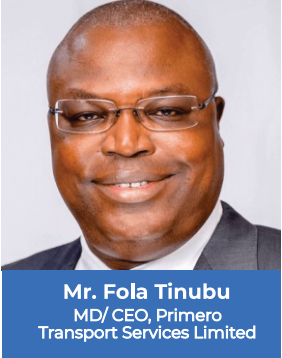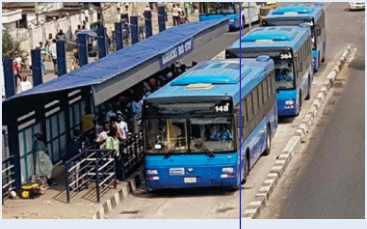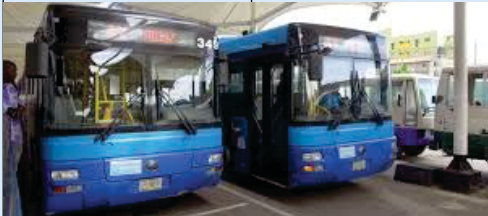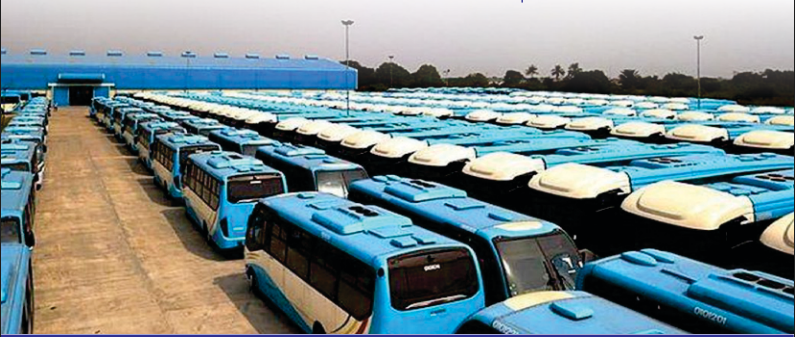
Driving the Future: Fola Tinubu on Grit, Governance, and the Road Ahead for Primero
- Road
- July 21, 2025
- No Comment
- 177

For Mr. Fola Tinubu, leading Primero Transport Services Limited, operators of Lagos’s iconic Blue BRT buses, is more than a corporate role; it’s a frontline position in Nigeria’s urban mobility story. As the MD/ CEO, Fola Tinubu has navigated the bumpy roads of business with uncommon resilience, steering the company through economic headwinds and rising operational costs. In a candid conversation with the Executive Director, ABIKE AWOJOBI, he reflects on the hard truths of running a transport business in Nigeria, from foreign exchange constraints to maintenance challenges. This interview reveals the man behind the movement and why he believes the journey ahead, though tough, is worth every mile.
Q: You operate one of the largest BRT fleets in Lagos State, and we all know that right now, business is not really smiling at entrepreneurs and investors. What would you say are the operational strategies that have helped you manage such a high volume, high-demand transport system efficiently?
A: Well, we’ve been doing this for ten years now. We know we have been doing something right to survive for ten years. And you are right that things are not rosy at all. In fact, since we started operations, things have been very challenging. We deployed a lot of technology to monitor our buses, ticketing system and other infrastructure. So, we have placed an emphasis on technological infrastructure to make us more efficient and make the system more reliable, and it has come a long way. I remember a time we created an app to inform commuters when the next bus will be at their preferred shelter right from the comfort of their homes. Also, there was a time LAMATA (Lagos Metropolitan Area Transport Authority) put on all our shelters the advisory infrastructure that enables commuters know when the next bus would arrive and it was updated in real time. Commuters will know “the bus will arrive in ten minutes” and when there’s traffic. But it all comes at a very high cost and we need more significant investment in technological infrastructure to achieve world class public transportation. We need both federal, state and local governments to invest in the space to ensure that we deploy more robust technology for our operations to be more efficient than they actually are at the moment.
Q: Lagos state has the second largest population in the country, and here you are managing the transportation sector for the state. How do you balance punctuality, safety and affordability in your daily operations?
A: Well, first of all, Primero TSL is not a Lagos state government agency. We are a privately owned organisation. People always think we’re a state government agency, but we are not – I would like to point that out. Secondly, our fares are controlled by the Lagos State government. So, the state government determines what we charge for public transport to be affordable for commuters. Also, safety has always been a major focus of our operations since inception. We regularly train our drivers to be more cautious during journey management to prevent incidents. I will give kudos to the Nigerian Police and the Lagos State government, because we are not a governmental agency, and we don’t have arresting power. So, the Lagos State government has gone way beyond the call of duty to work with us on ensuring safety because whatever affects Primero TSL affects Lagos State’s public transportation image. So, we’ve been working closely with the Lagos State task force to ensure that people don’t encroach on the BRT corridor. It’s a tough one because we are very impatient in this country. Everybody wants to ply the BRT corridor when there is traffic congestion on the road, thereby causing more problems. But it is what it is. The Lagos State government is working with us on the safety and security aspect.

Q: Great, now how about affordability?
A: I’ve told you about that; Lagos State government actually determines the BRT fares, so the fares are out of my hands. Look, affordability is a vital element of any public transport system. If you take the affordability out, then it is no longer public transport. It becomes an elitist service. Like Uber, you cannot say Uber is a public transport because only the upper class and upper-middle class can afford it. Therefore, the Lagos State government regulates the fares through LAMATA and they are in responsible for fare affordability.
Q: How is Primero TSL innovating around cost management and fleet sustainability?
A: We have introduced lots of innovative ideas. We have plans to set up an assembly plant so that we can start assembling the buses here in Nigeria and start producing some spare parts. However, it all comes at a cost, and if you do not have the funding, there’s nothing you can do. And our bankers, while they have supported us tremendously in the last ten years, we are currently exploring solutions surrounding securing more capital on more favourable and market-reflective terms.

Q: Are you actively seeking partnerships, not just in Lagos but in other states?
A: If it does not work in Lagos State, how will it work in any other state? Lagos State has a population and almost everything. Look, you see, my problem with us in Nigeria is that everybody wants world-class services as obtained all over the world, but nobody wants to pay for it. These things come at a cost. If it’s not working in Lagos State with its large population, how will it work in any other state?
Q: But Lagos State is not the only state with a large population. Kano, right?
A: But they don’t have the revenue that they have in Lagos. I’m struggling with Lagos, why will I move to Kano State?
Q: Maybe take a leap of faith?
A: A leap of faith? Do you know how much we invested in the Lagos State project which we’ve not regained? So, I should go to my bank and say, “let’s take a leap of faith, let’s go do business in Kano State”, they will laugh me out of the boardroom.
Q: Other states that are running mass transits are also pivoting towards other forms of vehicle transportation and powering their vehicles, such as the use of CNG. Are we looking at having Primero TSL buses running on CNG?
A: We are working with the Federal Government to convert about 200 of our buses from diesel engines to CNG engines. But that comes at a cost. If you’re going to need a conversion, the conversion has to be paid for, because people say “oh convert”, but who will pay for it? It’s good on paper, but somebody has to write the cheque. However, the Federal Government is working with us on that right now.
Q: What about Electric Vehicles?
A: See, this is my problem with Nigerians. There is a Yoruba proverb, “Obe todun owo lopa”. “Everybody wants the sweet soup, but nobody wants to pay for it”. Do you know how much each one of those EV buses cost? The good ones cost about Four Hundred Thousand to half a million dollars per bus. So, if you purchase it without a subsidy, how do you break even? When I am struggling with those I bought for about a hundred thousand dollars, now you want me to purchase one for half a million dollars, how do I break even? So, who’s going to pay for it?
Q: So, it still boils down to government intervention?
A: Look, the bottom line is this, we need to sit down and say what do we want in Nigeria, especially in Lagos State. Do we want an Okada mode of public transportation or do we want a world class service? If it is going to be a world class service, what are the costs, who pays for it? And then we agree, and I have been saying this for almost six, seven years now. We all need to sit down, the government, the operators, the commuters. And ask questions, who pays for it? Because it has to be paid for. But all I hear everybody tell me, “Oh Fola in America, this is what they do, in England, the bus comes and exits the terminal after 10 minutes, whether there is only one person there or not.” But all of those things come at a cost. And it’s a cost nobody wants to pay for. The government will tell you they don’t have the capital. The commuters will be telling you that their salary is too low. They don’t want to pay for it. So now I’m Santa Fola, and even if I’m Santa Fola and I decide to do it, if I go to my bank, the bank doesn’t care, but the bank wants me to show how I’m going to refund their capital investment.

Q: So, essentially, it’s a cycle that seems impossible to break
- When I was in primary school in Lagos, there was a service called LMTS (Lagos Metropolitan Transport Services) that folded up. When Lateef Jakande came in 1979, he started another system called LSTC (Lagos State Transport Corporation) which also folded up. During Asiwaju Bola Tinubu’s tenure as Lagos State governor in 1999, he started the first BRT, which also folded up. The question is, why are they all folding up? Is it the same people who ran the LMTS who ran LSTC, and is it the same people who ran LSTC who ran the first BRT? They cannot all be stupid. Look, I am not as stupid as I look. I may not know what I’m doing, but the people who managed LMTS, LSTC, and the first BRT cannot all be stupid. The question everybody should be asking is Why did LMTS fail? Why did LSTC fail? Why did the first BRT fail? Why is the second BRT going through a similar challenge? That’s a question everybody should be asking that nobody’s asking. All I hear is, “Oh, we want AC, we want EV buses, we want world-class service.” And I keep looking at them. I remember during COVID-19, some people came, “Oh Fola, we saw this, you need to install a screening machine that will screen everybody before they board your bus.” Do you know the cost? Do you know how many bus stops I have to install them in? So, who will pay for it? Nobody tells me who will pay for it. All I hear is we want this and that. Somebody has to pay for it. There’s no free lunch even in Freetown.
Q: Let’s look at another ten years, where do you hope to see Primero? What do you think would have changed?
A: Ten years from now, you don’t even want to know what the last ten years have done to me. I don’t know. Look, if the will is there, there’s an opportunity in Lagos State to develop a world-class public transport system. But the will has to be there. The political will should be there. I’m not just talking about government now, because everyone says, “Oh, government, government.” No. The commuters have to sit, the operators need to sit, and the government needs to sit. Both federal, state and local governments should be actively involved in public transport systems. I keep emphasising, it’s not just a Lagos State government issue. We all have to look at the kind of service we want. These are the cost implications and this is how we will achieve it. Until that is done, we will keep blaming one another. But if we are not careful, we will end up having an Okada mode of public transportation. If we want a world-class service, we also have to decide who pays for it. How do we pay for it? But you don’t dump everything on a private company.
Q: How have your services improved the commuting experience for Lagos residents, particularly in terms of mobility and their quality of life?
A: In terms of feedback, I get it not only from commuters but also from my staff, and I always give everybody in my corridor my number so they can call me. I have a good idea of what is going on. It would be very irresponsible of me not to know what is going on. It is challenging because people still spend a long time waiting to board buses. Part of it is the traffic situation in Lagos State and the requirement for additional buses on the road. According to World Bank statistics, Lagos State needs about 7,000 (seven thousand) buses moving through the city daily. But today, including Primero TSL’s fleet, fewer than 2,000 (two thousand) buses are on the road. There’s a lot of room to grow and both the Lagos State and the Federal governments need to invest more in public transport to make it affordable and convenient for people to board buses. We are doing everything humanly possible to make sure we reduce the wait time and improve our services. But it is what it is. Unfortunately, when you don’t have the capital to fix the buses as and when due, your fleet numbers will reduce, and it affects the commuters’ wait time.

Q: In a broader term, can you give us some of the unique challenges that you face with Primero, whether it be infrastructure, policy issues, be it funding?
A: Where do you want me to start from? Infrastructure, yes, we need good roads. Look, we are trying but we need to work more to ensure the roads are better. In Lagos State, because of the land mass, we cannot build enough roads to make it easy for everybody to commute. The only solution is to get a world class public transport system so that people can easily move from point A to point B. But having said that, like I told you Lagos State government is working on it, they are trying. But the challenges we face are numerous. The biggest one is, anytime the naira loses value, our cost of operation increases. Because almost everything we use on the buses are imported. Our cost of operations keep galloping while our fares are artificially kept low for affordability. And we’ve been talking to the Lagos State and Federal governments to bridge that revenue gap, which is what is done all over the world.
Q: In terms of subsidy?
A: In terms of subsidy, but so far, we are still talking. Unfortunately, subsidy in Nigeria connotes a bad word because of Nigeria’s experience with subsidy. But public transport all over the world is subsidised. If you want to charge the full fares, it will not be affordable. And if it is not affordable, it is no longer public transport. So public transport needs to be subsidised. But the political will has to be there. Because if you want a world-class service, it has to be paid for. The question is who pays for it. The commuters, anytime there is an increase, everybody starts screaming that they can’t afford it, that they are taking the affordability out of it. But you don’t pass the social responsibility of a state to a private company. And to me, that seems to be what is happening right now. That’s our biggest challenge. Look, we know when the buses are due for service, but when you don’t have the funding to buy spare parts to fix it, what will you do?
Q: Essentially, you are saying these operations are not as profitable as it ought to be?
A: It’s never been profitable. There’s nowhere in the world where public transport is profitable. If it’s profitable and I am allowed to charge the full fares, then it will not be affordable for commuters. So that is why all over the world, public transport is subsidised.
Q: So, how are you trying to bridge between the fact that the rates are capped and you also have to make profit? How do you balance it?
A: It’s a tough one and, that’s why the investment in public transport is not as much as it should be. The industry needs a huge investment, but if people are going to invest, there must be a modicum of profit for them. And they must see that there is a modicum of profit before investing their capital. But if you artificially keep the fares low and allow the market to dictate the cost of operations, it creates a mismatch, which creates a problem for the operators. But like I said earlier, you do not pass the social responsibility of a state to a private company. Yes, you can get a private company to run your public transport; it’s done all over the world, because we all believe a private company will be more efficient in operations. But you do not artificially keep the fares low, and you are allowing the market to dictate the cost of operations; the operations cost will continue to rise. I remember when we started operations. Diesel used to be one hundred and sixty naira a litre. It went all the way to over one thousand six hundred naira a litre and has now settled down at slightly over one thousand naira a litre. And if you look at the percentage of increase, it’s over one thousand per cent. And our fares, in the last ten years, have increased maybe by fifty per cent, sixty per cent.
Q: Give us the specific figure here. So, prior to the increase in diesel price. Let’s say from Ikorodu to CMS, one of your routes, what’s the price?
A: We started at three hundred and fifty. But now we are charging about eight hundred naira.
Q: Oh, It’s not commensurate with the price increase of diesel.
A: Precisely. And diesel is our number one operation cost.
Q: But how are you managing diesel cost fluctuations and maintenance, charging that fee and still being in operations?
A: Look, we’ve cut costs to the bone. I remember there was a time when our salary bill was about a hundred and twenty million naira a month. Now we’ve reduced it to less than fifty million naira a month. We’ve found ways to reduce costs but all of these things affect our operations and service delivery. Apart from operational costs challenges, the political will has to be there. Look, I am not talking just about Lagos state government, I am talking about the federal government, and the local government also. If you google London transport, how they are funded, it shows that about thirty five percent of their revenue comes from both city of London and British government subsidies and it’s like that all over the world. In fact, there are some countries where about eighty percent of the revenue comes from government subsidy and some as low as twenty percent, depending on the system you select. But there’s nowhere you have a world class public transport that there’s not some sort of subsidy. Because if you want to charge the full fare, it will not be affordable. If I want to charge the full fare from Ikorodu to TBS today, I will have to charge nothing less than one thousand five hundred naira to two thousand naira one way. How many people will be able to afford that? And therein lies the problem.
Q: So, moving forward, what is the future for Primero TSL? I remember there was a time, there were talks about maybe you having an assembly plant?
A: We have so many plans in the pipeline. We’ve done lots of firsts. We are the first ones that introduce the internet into the buses. But all of these things come at a cost. And if you are not profitable, then you have no choice but to cut all these things that people look forward to just to stay alive


